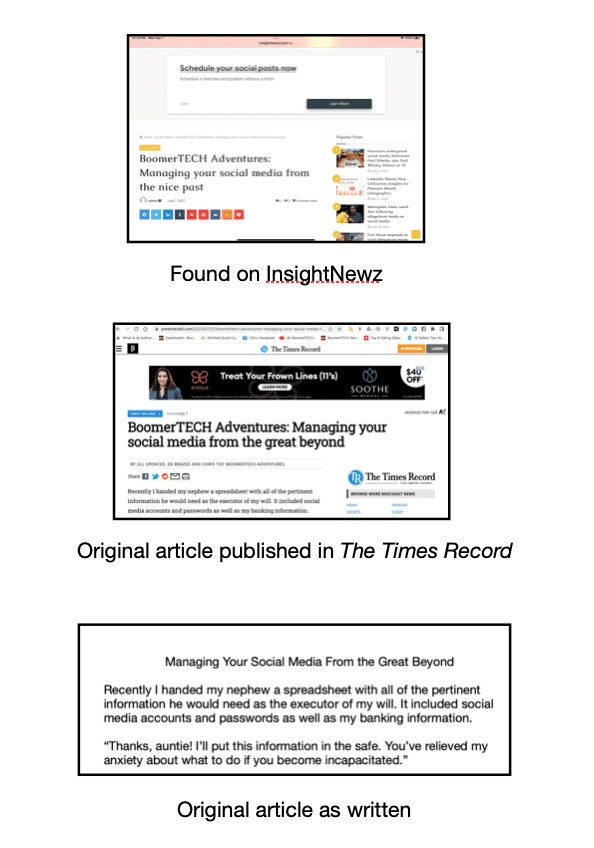The World Wide Web (www://) is certainly an interesting place full of surprises. Some of what we find there is not to be trusted. Let me give you an example that strikes close to home.

BoomerTECH Adventures Corporate Headquarters
While at the BoomerTECH Adventures corporate retreat, I was searching for a link related to BoomerTECH Adventures. Instead, I found replicas of our articles for the Times Record in some dubious places.
One of those internet sites was InsightNewz. Below is an image that shows what was on InsightNewz, what was originally published in The Times Record, and the original piece from my computer. What do you notice when comparing the three screen shots?

Things to notice:

In some ways, this experience is rather amusing. However, what I find really disturbing is that the piece I wrote could be so easily lifted and words changed and republished. This topic of social media wills is rather benign. What if, however, I had been writing an opinion piece or a description of an event? My intent could easily be misrepresented. False impressions could be relayed to the reader. Might I say, fake news could be generated?
It’s important to know the origins of what you read online before taking the information as gospel truth.
Here’s one way you can check who owns the site you are reading. Use Who.is.

Type in the the URL or website in the box and you will find out who own the site. Here’s what I found for InsightNewz.


I found out that it’s registered in Iceland, but that doesn’t mean the website is managed from there. There is a regular website.

So…I don’t think this is a group perpetrating evil deeds. However, if I just stumbled across this article by chance and didn’t know anything about BoomerTECH Adventures, the poor English would have been enough of a red flag to suggest this site was not where I wanted to get my information. A better choice would be to google BoomerTECH Adventures and see where that took me.


In summary…be judicious in what internet sites you rely on for information. Here’s an article my BTA colleague wrote this past week on a similar subject, “Critical thinking online this political season.”
One last word on the usefulness of the Who.is site. Years ago when I was teaching, I was looking for information about Dr. Martin Luther King. While searching the internet, a site popped up that was attractively arranged with links and images. As I delved into the site the information turned ugly and incorrect. Giant red flags, so I did a Who.is search. Turned out that the site belonged to a white supremacist group. I wouldn’t have known that if I hadn’t checked.
Totally off the subject of this post–BTA would like to offer you a freebee just for fun.
Notifications